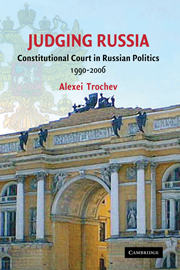Book contents
- Frontmatter
- Contents
- List of Figures and Tables
- Acknowledgments
- Abbreviations
- Notes on Transliteration
- 1 Introduction: Three Puzzles of Postcommunist Judicial Empowerment
- 2 Nonlinear Judicial Empowerment
- 3 Making and Remaking Constitutional Review, Russian-Style
- 4 Russian Constitutional Review in Action (1990–1993)
- 5 Decision Making of the 2nd Russian Constitutional Court: 1995–2006
- 6 The Constitutional Court Has Ruled – What Next?
- 7 The 2nd Russian Constitutional Court (1995–2007): Problematique of Implementation
- 8 “Tinkering with Judicial Tenure” and “Wars of Courts” in Comparative Perspective
- 9 Conclusion: Zigzagging Judicial Power
- Appendix
- Bibliography
- Statutes and Decrees
- Court Decisions
- Index
8 - “Tinkering with Judicial Tenure” and “Wars of Courts” in Comparative Perspective
Published online by Cambridge University Press: 25 July 2009
- Frontmatter
- Contents
- List of Figures and Tables
- Acknowledgments
- Abbreviations
- Notes on Transliteration
- 1 Introduction: Three Puzzles of Postcommunist Judicial Empowerment
- 2 Nonlinear Judicial Empowerment
- 3 Making and Remaking Constitutional Review, Russian-Style
- 4 Russian Constitutional Review in Action (1990–1993)
- 5 Decision Making of the 2nd Russian Constitutional Court: 1995–2006
- 6 The Constitutional Court Has Ruled – What Next?
- 7 The 2nd Russian Constitutional Court (1995–2007): Problematique of Implementation
- 8 “Tinkering with Judicial Tenure” and “Wars of Courts” in Comparative Perspective
- 9 Conclusion: Zigzagging Judicial Power
- Appendix
- Bibliography
- Statutes and Decrees
- Court Decisions
- Index
Summary
Judging Russia's trials and tribulations with constitutional review is impossible without comparing them against the experiences of constitutional courts in other countries. Is Russia's nonlinear judicial empowerment unique? To answer this question, we need to look at actual judicial politics elsewhere in order to detect whether judicial empowerment is a dynamic and nonlinear process. This chapter explores how other countries dealt with the two most controversial issues that arose in making and remaking the Russian Constitutional Court. One of them was the role of politicians who repeatedly tinkered with judicial tenure attempting to create a friendlier bench, as I discussed in Chapter 3. In the process of this tinkering, judges had to become politicians and lobby the political branches to either lengthen their tenure or leave their Court alone. As a result of this tinkering, Justice Morshchakova, for example, overstayed her term on the bench – a fact that generated conflict within the Court. If my argument that short-term power needs prevail in the business of creating constitutional courts is correct, we should at least examine the attempts (successful or failed) at changing judicial tenure in other countries.
The second main controversy involved the repeated clashes between the constitutional court and other top courts. As I demonstrated in Chapters 3 through 7, the Russian Supreme Court correctly foresaw these clashes, tried its best to prevent the RCC from reviewing verdicts of ordinary courts, and, when that failed, staunchly defended its appellate jurisdiction from invasion by the RCC and even fiercely competed for the power to police Russian federalism.
- Type
- Chapter
- Information
- Judging RussiaThe Role of the Constitutional Court in Russian Politics 1990–2006, pp. 258 - 284Publisher: Cambridge University PressPrint publication year: 2008



